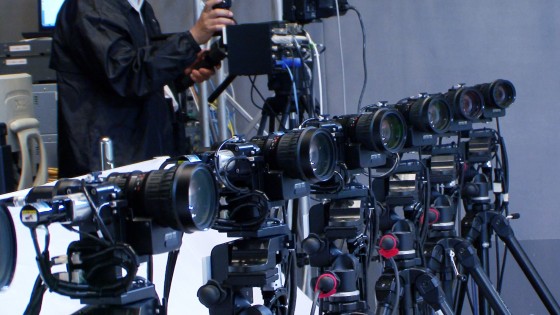
Robohub.org
Multi-viewpoint robotic camera system creates real ‘bullet time’ slow motion replays

This multi-viewpoint robotic camera system, under development by NHK, links the motion of eight sub-cameras to that of an individual camera, so that all the cameras film the same moving object.
“Using this system, you can create the effect of stopping time, and moving the viewpoint all around the subject.”
“Previous methods used a fixed camera, so they could only capture subjects moving in a narrow or limited space. But this multi-viewpoint robot camera system can film dynamically moving sports, or subjects at lots of locations in an extensive space.”
Each robot camera has two motors, for pan and tilt. The cameras also share lens data, so they can zoom in unison.
“Pictures taken with robot cameras inevitably have discrepancies in direction control. So simply switching between them doesn’t give smooth pictures. To solve that problem, we’ve brought in a computer, which redoes the direction control virtually. Image processing is done, to virtually orient the cameras in the direction of the subject, making it possible to switch between the cameras.”
“Pictures from this system can be sent out about one minute after filming is finished. First of all, we intend to use this for live sports broadcasting. We’d like to make it easy to understand what’s happening, by providing multi-viewpoint pictures instead of the current slow-motion replay.”
This multi-viewpoint robotic camera system can also be used as an image capture system for integral 3D TV, under development by NHK. By generating integral 3D video from multiple-viewpoint footage, 3D video of sports events will be viewable on integral 3D TV.
tags: Research




